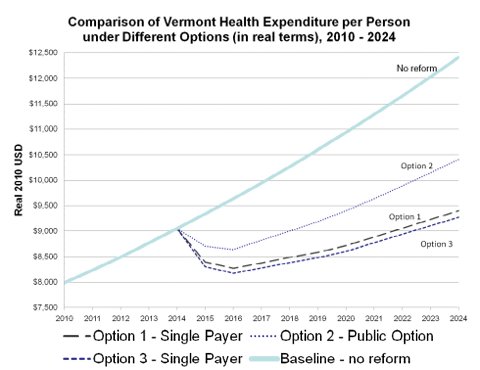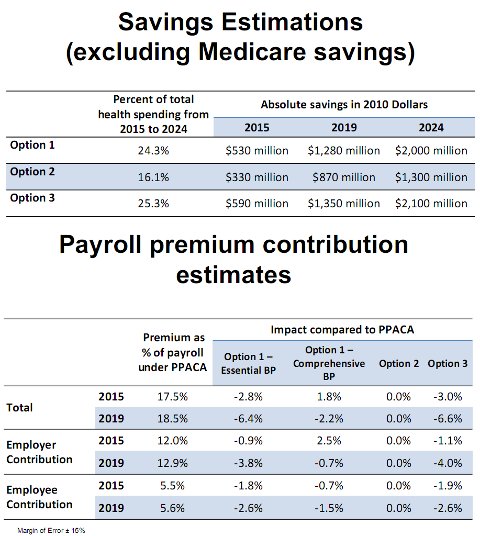... newer stories
Sonntag, 13. März 2011
Why California needs single payer health-care!
trickymaster, 15:50h

On top of that:
"Working families are being gouged to the point of having to drop their already woefully inadequate coverage. Coverage so bad and so bare bones that it usually carries a deductible of $5000-$10,000. For Blue Shield customers who buy their own insurance, the likely rate hikes will be the third since October, amounting to up to 59 percent in some cases."
www.californiaonecare.org
The first thing we have to do is drive all private insurers out of business and establish a single payer health-care system like the one that Vermont is working on, with the difference that our single payer health-care system must include people enrolled in Medicaid and Medicare.
Many people don't know:
California has been trying to pass a single payer bill TWICE (2006 and 2008). Both only failed because Schwarzenegger, a Republican, vetoed the bills. This time, all Jerry Brown needs to do is to sign the bill. Single payer health-care would:
-Cover all California residents
-No deductibles
-Cover at least 90% of all health care costs
-Be self-sufficient and independent from the government
-And HALF the cost.
Where is the evidence for the savings? Take a look at any country with single payer:
Per capita expenditure on health (USD):
Canada (state-wide single payer): $3,895
Australia (nation-wide single payer): $3,137
Japan (nation-wide single payer): $2,581
Countries with other universal health care systems:
UK (socialized medicine): $2,992
Norway (Hybrid between socialized and single payer): $3,601
Germany (Multi-payer health care): $3,588
Norway (Hybrid): $5,910 (HOWEVER, it's completely free of charge!)
Now compare that to the United States: $7,290
http://en.wikipedia.org/wiki/Health_care_systems#Cross-country_comparisons

On top of that, their health care costs are rising at a slower rate than ours. Now I want to debunk some of the main points that Rethugs and Teabaggers make. I lived in Europe for most of my life.
But they ration health care and you end up staying in lines.
NO. There is no rationing. In fact, I have never seen any rationing that comes even close to what I see in the US health insurance industry. There are no lines in hospital.
But the government will choose your doctor.
NO. You can choose any doctor, dentist, specialist, hospital you want at any time. You pay the same co-pay (0-10 euros in Germany per quarter). When you're under 18, all you have to do is show your health insurance card, that's it. Since 2005, you can use your European Health Insurance Card in any EU member states, Switzerland, Iceland, and Norway saving your a lot of paper work and bad surprises.
But their system is completely unsustainable and will collapse.
NO. In fact, the health care budget is one of the best balanced budgets in European countries thanks to the ability to drive down costs. The health care system acts independently from the government, state-owned rather than state-run. There is a difference.
Help us to revive the single payer bill in California. For more information:
http://californiaonecare.org/
... link (0 Kommentare) ... comment
Mittwoch, 19. Januar 2011
The first Vermont single payer draft is in.
trickymaster, 18:38h

You can Download the full draft here: Link
You can watch the full draft here: Link
Vermonters will be able to choose between 3 proposals:
Option 1
1A--Government-run Single Payer system with comprehensive benefit package
1B—Government-run Single Payer system with essential benefit package
Option 2—Public Option
Option 3 (Public-Private Single Payer)
Essential benefit package, Independent board, third party manages provider relations and claim adjudication/processing
About 1A and 1B:
Comprehensive Benefit Package:
- Reduce financial barrier to provide easy access to all health services, including nursing home and homecare.
- Cover dental, nursing home and homecare.
- Emphasis prevention and primary care
- Financial risk protection against health expenditure tjat causes impoverishment.
• Cost sharing by patients: Very small co-payments to discourage improvident demand while not impede access.
Essential Benefit Package:
- Cover every resident with at least 87% of medical and 77%of drug expenses (as the average private health insurance now covers)
- Expand coverage for dental and vision care.
- Exclude nursing home and homecare.
- Emphasize prevention and primary care
- Financial risk protection against health expenditure that causes impoverishment by capping out-of-pocket cost.
- Availability of supplemental coverage in addition to the essential benefit package with private insurance.
• Cost sharing by patients: Modest copayments for outpatient services (no copayment for preventive services), and deductible and coinsurance for inpatient hospital services.
This is how much the options would save comparatively:


Dr. Hsiao recommends Option 3 which would create an independent single payer system that provides services through the private sector. It would save the most money and be the most flexible.
I disagree. Option 1A would cost more the first year, but the cost would lower over time compared to people living with Option 1B or 3 who would also have to purchase supplementary dental insurance. Does the first draft take that into consideration? I doubt. I also think that Option 3 is based on ideal market conditions which are never given in the real economy.
Option 1A provides far superior services over the long-run and avoids that Vermont has to go through decades of trial-and-error only to come to the same result that we see in European countries = a comprehensive universal health-care system.
My thoughts go hand-in-hand with Don McCanne's, MD, findings. He is Senior Health Policy Fellow at Physicians for a National Health Program and also well-known for his voice in the successful California OneCare campaign.
http://vermontforsinglepayer.org/expertscomment
However, I agree with the concepts of Option 3. The single payer health-care system should be government-owned but operate with the least distortion through interest groups in favor of the beneficiaries.
... link (0 Kommentare) ... comment
Montag, 3. Januar 2011
Health care updates for New Year 2011.
trickymaster, 17:18h

Meanwhile, in Vermont the first draft for a single payer health care system will be submitted on January 19th to the legislature, followed by a 15 day public comment period.
All proposals must meet the following criteria defined in the bill:
- Universal access and coverage for all essential health services for all Vermonters
- A transparent, efficient and accountable system
- Free choice of providers for all Vermonters
- A system of containing costs
- A financing mechanism that is “sufficient, fair, sustainable and shared equitably.
I'm more than happy that Vermont is on the right track. Once their system is up and running, people will realize how government-run health care provides superior services for less.
Source: What comes next for single payer in Vermont?

"The percentage of Americans younger than 65 who receive health insurance through their employer has fallen below 60% not only because of high unemployment. It's also because many of those who remained on the job saw their coverage eliminated or reduced, or dropped it themselves because their plan became too expensive.
The conclusions come from separate reports issued by the Economic Policy Institute and the Commonwealth Fund. The organizations each released a report in November and December on the cost and prevalence of employee coverage.
[...]
On Dec. 15, the institute put out another report noting that those who did have insurance were paying more for it. It said family health insurance premiums rose by 131% between 1999 and 2009 -- a rate far outstripping the 38.1% rise in average hourly earnings for nonmanagement employees and the 28.8% overall inflation rate."
http://www.ama-assn.org/amednews/2010/12/27/bil11227.htm
This is why I don't understand why labor unions are so vehemently defending employer-based health care. Just a few have access to cadillac health insurance plans (very generous health plans with no co-pay) and the numbers are decreasing.
It's for this reason why civilized countries simply tax all employees and employers. The money goes directly to a single fund that provides coverage for all citizens and residents.
It would take only a few amendments to turn the current health reform bill into such a much better system that even President Obama had in mind:
We need to discourage employer-based coverage so that all people purchase health care through the Exchanges. The money that pays for the subsidies would come directly from employers through a separate tax. Since the cost is spread to all employers, the cost of health care would lower for large and small employers as well as employees.
Then, you only need to add some new powers to the government (negotiating drug prices, pay-as-you-go instead of fee-for-service, power to lower premiums etc.) and you would have a much better, more affordable universal health care system. The question is, when are our politicians going to wake up and take real action?

By Elise Foley
Huffington Post
"Just before leaving town for Christmas, senators reached a deal to ensure Republican support for the bill. It will now go for a vote by unanimous consent. The House remained in Washington to act on the bill.
The new deal reduces the cost of the bill by $6.2 billion from its previous Senate version and $7.5 billion from the version that passed the House, according to a statement from Coburn's office. It calls for closing the Victims Compensation Fund in 2016 instead of 2031, preventing claimants from pursuing civil lawsuits if rejected from the fund, and limiting infrastructure costs and attorney fees."
Source: http://www.huffingtonpost.com/2010/12/22/911-first-responders-heal_1_n_800326.html
I commented on Republican obstruction towards the 9/11 Responder bill on July 30, 2010. On one side, I'm more than happy that it finally passed. On the other hand, it's a very bitter pill. Our heroes fought for this for 9 years. Now they only get 5 years of benefits for the chronic illnesses caused by toxins?
The solution would have been more than simple. One only has to take a look at PPACA. In the bill, a provision allows residents of Libby, Montana, who have been exposed to asbestos for years to enroll into Medicare. A few hundred heroes would NOT have broken the bank, especially since they would still pay the Medicare premiums. It's a perfectly rational solution for providing affordable long-term coverage.
I can only wonder why Congress did not add 9/11 heroes to this provision.
... link (0 Kommentare) ... comment
Dienstag, 21. Dezember 2010
Do the health reforms require insurers to offer dental coverage?
trickymaster, 22:53h

"Q. Does the health care reform law require insurers to offer dental coverage?
A. No. The law doesn't require insurers to cover dental care for adults, but there's a good chance that could change when the state insurance exchanges begin operating in 2014. [...]
Although adult dental care is not among some examples of benefits the law says must be covered, consumer advocates say it appears that the U.S. Department of Health and Human Services could include it in the regulations that will detail what essential benefits must be provided."
In other words, bad news. I'm disappointed that the government completely underestimates the life-saving importance of dental coverage. Diseases in the mouth that are not treated can cause serious heart diseases. However:
"The law treats children differently from adults when it comes to dental care. Health care plans sold in the exchanges must include dental coverage for children. The age limit will be set in the regulations."
Source: http://www.aarp.org/health/health-care-reform/info-12-2010/hcr_explained_dental_coverage.html
This is the typical attitude towards dental care. People assume it is something only minors need to put their teeth in the right order. That's simply not true. Every person needs to go to dental check-ups at least twice a year.
The separation of health, dental and eye care is one of the biggest scams of the private health insurance industry. The health of a person depends on the regular and cooperation of all those fields. That's why universal health care systems do not distinguish between the two. All get their money from a single fund through rates, premiums or taxes.
If the United States wants to work towards the goal of universal health care, the HHS must require insurers to provide health, dental and visual in a single, comprehensive health plan or better, set up a single payer health-care system that funds all three. I want to thank Ms. Jaffe for doing a great job of informing the public about this. For most people (including myself) it is nearly impossible to find out what kind of services will be guaranteed under the new law.
... link (0 Kommentare) ... comment
... older stories